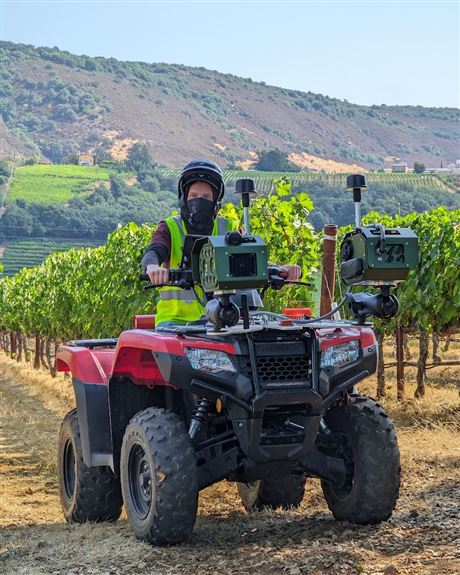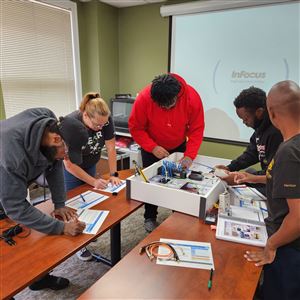When robotics and tech leaders last converged in Pittsburgh for an event of this scale, the focus was on aviation.
Think: automated baggage handling, wastewater management and self-driving wheel chocks to stop planes from rolling away. The conversation was rich enough to spawn a new startup, Journey Robotics, and to continue as an annual summit.
Now, there’s a new focus, one that brings the city to the farm.
Whether harvesting, monitoring crop health, or connecting with customers, the needs of modern farming have already sparked a variety of agriculture technology startups in the Pittsburgh region. Last week, some 250 leaders convened for three days of networking that organizers hoped would foster greater collaboration and new solutions.
Agriculture was chosen as the focus in part because of the “immense headwinds of climate change, decarbonization [and] labor issues,” said Kevin Dowling, director of the Robotics Factory, an offshoot of the region’s $63 million Build Back Better grant.
“We're starting to see several hundred million dollars for acquisitions of some of these companies with specialized technology in this area, and we hope to grow more of those here in Pittsburgh,” he said.
Not every effort will be a success. Last year, local startup Fifth Season left lettuce wilting in Braddock after making a big bet on indoor farming with robotics and AI.
But Mr. Dowling doesn’t necessarily see that as a failure. He remembers buying the startup’s leafy greens at Giant Eagle. “It did prove that it was possible,” he said.
And just up the road, another startup, Four Growers, is giving some of the same ideas new life. Its first product, GR-100, is an autonomous, tomato-harvesting bot.
“The sector is no longer the image of the old man with a pitchfork that we see in paintings,” said Regina Black, a senior adviser to the U.S. Secretary of Agriculture. “It's a self-driving tractor, with the ability to gather a massive amount of data — on yields, on soil quality, on water levels — that's then uploaded to the cloud and analyzed by AI.”
That kind of modernization helps tell a farmer “exactly how much fertilizer to use, and exactly where to apply, so their land is taken care of, and they're not wasting resources,” she said.
Ms. Black, a Pittsburgh native, kicked off last week’s summit from Bakery Square, a technology corridor built out of a former National Biscuit Company factory. She challenged the entrepreneurs in the room to design solutions that serve producers of all sizes.
“Technology has to work for everybody,” she said. “It can't be a privilege, or only for those who can afford it.”
The USDA is funding tech solutions through its National Institute of Food and Agriculture, including a grant to Carnegie Mellon University to develop drone monitoring systems for wildfires, she said. In January, Pennsylvania received a $26 million grant from the USDA to shore up food supply chains.
Funding could also flow from the state through Gov. Josh Shapiro’s proposed $10.3 million agriculture innovation fund.
Carnegie Mellon University President Farnam Jahanian said historic levels of investment in science, technology and innovation have created “a once in a generation moment” that is unlikely to last.
“There's no better time to tackle these amazing challenges,” he said.
Across Pennsylvania, small farmers are hungry for tech that can help them optimize and adapt, said Russell Redding, the state’s long-serving agriculture secretary. He highlighted a British company using drones to count orchard blossoms, saying “we need that in Adams County.”
Agriculture supports 593,000 jobs in Pennsylvania and funnels $132.5 billion to the state economy each year, according to the most recent state government tally.
The majority of those farms, however, are small, family-run operations, that may not have the resources needed to make large bets on technology. Mark DeSantis recommends founders look a bit further afield.
“Get on an airplane,” he said. “Fly to France or California and convince them that people in Pittsburgh can help.”
Mr. Desantis is CEO of Bloomfield Robotics, a Lawrenceville-based startup selling AI-powered cameras to vineyards and blueberry farms in South America. He said despite 40 years of local interest in agriculture tech, dating back to the opening of CMU’s Robotics Institute, the industry remains a “nascent movement.”
“I would say that we have the most important ingredient, which is talent,” Mr. Desantis said.
Attendance was varied throughout the week, with only a few dozen attendees brainstorming solutions on sticky notes Thursday morning.
“This is definitely just the start,” said Meredith Grelli, an entrepreneur and professor at CMU’s Tepper School of Business, who delivered a keynote to the group. “I think farmers aren't always top of mind for technologists, and so I'm so glad that they're shining the spotlight.”
Ms. Grelli described the struggle she faced growing her own agriculture enterprise — a whiskey distillery in the Strip District.
“This model was illegal at the time,” she said. “We ended up … changing three state laws.”
Ms. Grelli also warned the room full of suits about the need to get out into the fields where their solutions would actually take root.
“One of the biggest challenges to serving this population is that farmers are incredibly busy,” she said. “They’re not sitting next to a laptop all day ready to respond to emails.”
Evan Robinson-Johnson: ejohnson@post-gazette.com and @sightsonwheels
First Published: April 21, 2024, 9:30 a.m.
Updated: April 22, 2024, 8:08 p.m.





